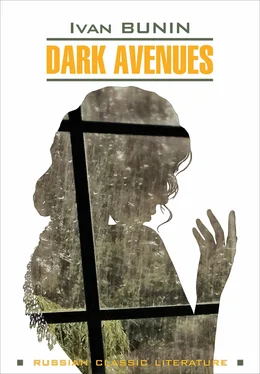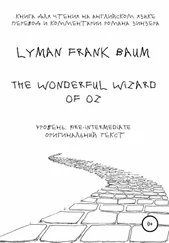1 ...6 7 8 10 11 12 ...25 Just before Christmas I happened to go into town. I returned when the moon was already up. And going into the house, I could find her nowhere. I sat down at the samovar alone.
“And where’s the mistress, Dunya? Has she gone out for a walk?”
“I don’t know, sir. She’s been out ever since breakfast.”
“Got dressed and went,” said my old nanny gloomily, passing through the dining room without raising her head.
“She probably went to see Zavistovsky,” I thought. “She’ll probably be here with him soon – it’s already seven o’clock…” And I went and lay down for a while in the study, and suddenly fell asleep – I had been frozen all day in the sledge on the road. And I came to just as suddenly an hour later – with a clear and wild idea: “She’s abandoned me, hasn’t she! She’s hired a peasant in the village and left for the station, for Moscow – anything’s possible with her! But perhaps she’s come back?” I walked through the house – no, she hadn’t come back. The humiliation in front of the servants…
At about ten o’clock, not knowing what to do, I put on my sheepskin coat, took a rifle for some reason, and set off down the main road to see Zavistovsky, thinking: “As if on purpose, he hasn’t come today either, and I still have a whole terrible night ahead! Is it really true that she’s left, abandoned me? Of course not, it can’t be!” I walk, crunching along the well-trodden path amidst the snows, and the snowy fields are gleaming on the left beneath the low, meagre moon… I turned off the main road and went towards Zavistovsky’s estate: an avenue of bare trees leading towards it across a field, then the entrance to the yard, to the left the old, beggarly house; the house is dark… I went up onto the ice-covered porch, with difficulty opened the heavy door, its upholstery all in shreds – in the entrance hall is the red of the open, burning stove, warmth and darkness… But the reception hall is dark as well.
“Vikenty Vikentich!”
And noiselessly, in felt boots, he appeared on the threshold of the study, lit too only by the moon through the triple window.
“Ah, it’s you… Come in, please, come in… As you see, I’m sitting in the dusk, whiling the evening away without light…”
I went and sat on a lumpy couch.
“Just imagine, Muza’s disappeared somewhere…”
He remained silent. Then in an almost inaudible voice:
“Yes, yes, I understand you…”
“That is, what do you understand?”
And at once, also noiselessly, also in felt boots, with a shawl on her shoulders, from the bedroom adjoining the study came Muza.
“You’ve got a rifle,” she said. “If you want to shoot, shoot not at him, but at me.”
And she sat down on the other couch opposite.
I looked at her felt boots, at the knees under the grey skirt – everything was easily visible in the golden light falling from the window – and I wanted to shout out: “Better you kill me, I can’t live without you, for those knees alone, for the skirt, for the felt boots, I’m prepared to give my life!”
“The matter’s clear and done with,” she said. “Scenes are no use.”
“You’re monstrously cruel,” I articulated with difficulty.
“Give me a cigarette, dear,” she said to Zavistovsky.
He strained timorously towards her, reached out a cigarette case, started rummaging through his pockets for matches…
“You’re already speaking formally to me,” I said, gasping for breath, “you might at least not be so intimate with him in front of me.”
“Why?” she asked, raising her eyebrows, holding a cigarette with outstretched hand.
My heart was already pounding right up in my throat, my temples were thumping. I rose and, reeling, went away.
17th October 1938
Ah, what a long time it was since I’d been there, I said to myself. Not since I was nineteen. I had once lived in Russia, felt it to be mine, had complete freedom to travel anywhere I wanted, and it was no great trouble to go some three hundred kilometres. Yet I kept on not going, kept putting it off. And the years came and went, the decades. But now it’s no longer possible to put it off any more: either now or never. The one final opportunity must be taken, for the hour is late and nobody will come upon me.
And I set off across the bridge over the river, seeing everything all around a long way off in the moonlight of the July night.
The bridge was so familiar, as before, it was as though I’d seen it yesterday: crudely ancient, humped and as if not even of stone but sort of petrified by time into eternal indestructibility – as a schoolboy I thought it had already been there in Baty’s time [57] in Baty’s time : Baty Khan (1205–55) was the grandson of Genghis Khan and, like him, leader of the Golden Horde. (прим. перев.)
. The town’s antiquity, however, is spoken of only by a few traces of the town walls on the precipice below the cathedral and by this bridge. Everything else is simply old, provincial, no more. One thing was strange, one thing indicated that something had, after all, changed in the world since the time when I had been a boy, a youth: previously the river had not been navigable, but now it had probably been deepened, cleared out; the moon was to my left, quite a long way above the river, and in its uneven light, and in the flickering, trembling gleam of the water was the whiteness of a paddle steamer [58] paddle steamer – колесный пароход
which seemed empty – so silent was it – although all its portholes were lit up, looking like open but sleeping golden eyes, and were all reflected in the water as rippling gold columns: it was as if the steamer were actually standing on them. It had been like this in Yaroslavl, and in the Suez Canal, and on the Nile. In Paris the nights are damp, dark, there is a pinkish, hazy glow in the impenetrable sky. The Seine flows under the bridges like black pitch, but under them there also hang the rippling columns of reflections from the lamps on the bridges, only they are three-coloured: white, blue and red – Russian national flags. Here there are no lamps on the bridge, and it is dry and dusty. But up ahead on the hillside is the darkness of the town’s gardens, and protruding above the gardens is the fire-observation tower [59] fire-observation tower – пожарная каланча
. My God, what ineffable happiness it was! It was during a fire at night that I kissed your hand for the first time, and you gave mine a squeeze in reply – I shall never forget that secret accord. The whole street was black with people in ominous, abnormal illumination. I was visiting your house when the alarm was suddenly sounded, and everyone rushed to the windows and then out of the gate. The burning was a long way off, beyond the river, but it was terribly fervent, greedy, urgent. Thick clouds of smoke were belching out there like a crimson-black fleece, bursting out from them on high were red calico sheets of flame, and near to us, trembling, they were reflected in copper in the cupola of the Archangel Michael. And in the crush, in the crowd, amidst the alarmed, now compassionate, now joyous voices of the common people, who were flocking together from everywhere and not taking their widened eyes off the fire, I smelt the scent of your maidenly hair, neck, gingham dress – then suddenly made up my mind [60] to make up one’s mind – решиться
and, turning quite cold, took your hand…
On the other side of the bridge I climbed up the hillside and went to the town along the paved road.
There was not a solitary light anywhere in the town, not a single living soul. All was mute and spacious, tranquil and sad – with the sadness of night in the Russian steppe, of a sleeping town in the steppe. The gardens alone had their foliage quivering, scarcely audibly, cautiously, from the even flow of the light July wind, wafting in from somewhere in the fields, blowing on me gently, giving me a feeling of youth and lightness. I was moving, and the large moon was moving too, its mirror-like disc rolling and visible in the blackness of branches; the wide streets lay in shadow – only in the houses on the right, to which the shadow did not reach, were the white walls lit up and was a funereal lustre twinkling on the black window panes – but I walked in the shade, treading along the dappled pavement – it was transparently paved with black silk lace. She had an evening dress like that, very smart, long and elegant. It was extraordinarily suited to her slender figure and black, young eyes. She was mysterious in it and insultingly paid me no attention. Where was that? Visiting whom?
Читать дальше












